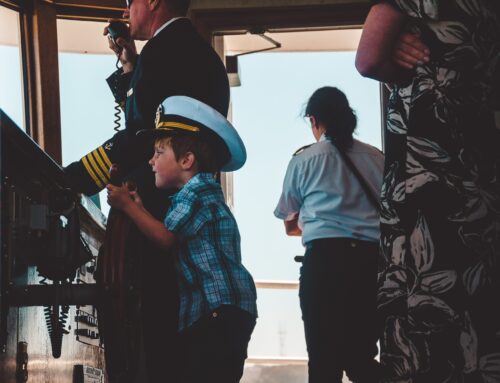I met Taylor Walker in 2011 while he was studying a Diploma of Management. He was one of a rather impressive cohort of young South Australian sportspeople – including a number of Crows and Thunderbirds players – who have since gone on to be leaders within their clubs.
I’ve watched from the sidelines in awe as Taylor has transformed from a cheeky country lad to one of the most dynamic leaders in the AFL. Through triumph and tragedy, he has led his team, with pride for his “boys” and passion for his game.
With the 2018 AFL season upon us, and in light of the tough end to last year’s season, I sat down with Taylor to reconnect and find out what the last few years have taught him about leadership.
KS: When you were selected as the Crows Captain by Phil Walsh four years ago, you shared ‘I want to be the leader that I was selected to be’. Have you stayed true to your authentic self?
TW: I was conscious that leadership can change people, and I didn’t want that to happen to me. I think I’m still me – it’s important to be authentic and true to yourself whatever happens in your life. But there are things that you need to develop and Pykey is really good with that, he will continually challenge me. When I first came into the leadership role I would be the jovial clown and he’d say ‘That’s not what leaders do’. I realised I like to be liked and that isn’t always possible when you are making decisions for the group. I’ve tried to maintain my jovial side, but it’s about picking the right time. The environment and who’s around. I think more deeply now than I used to. I think about the consequences of a statement or action.
KS: As the captain, I imagine one of your key roles is building and maintaining the club culture. Tell us about how you set standards for the players and benchmark their behaviour.
TW: It’s a very important part of the role. Culture is everything. We have what we call a trademark – it summarises our actions and behaviours. The Crows trademark sets the standards and we make it clear to everyone that joins the club that what we want comes out of working hard. Fortunately maintaining that trademark is not just up to me. Rory Sloane and I complement each other – he’s good at checking off details and managing our trademark, while I’m happy addressing the group and asking the hard questions of everyone. The goal is to get as many blokes as possible standing next to Rory and I, representing the sort of behaviours we expect. We have had players who challenged our culture and in the end, we had to make the decision that no one individual is above the group. If he’s not on the bus, then he’ll get booted off.
KS: So having a leadership group makes the role of Captain easier?
TW: Absolutely. The more blokes at the front of the bus, the better. But it takes time because leadership in our business sometimes isn’t necessarily seen as cool. Making tough decisions that 45 blokes might not all agree on is hard for some young guys. It’s when their fellow players vote for them to be a leader that the penny drops and they rise to the occasion. We have four players in our senior leadership group – myself, Rory and Tom Lynch and this year Matt Crouch has joined us. Then there are other special leadership portfolios such as communications and social media, training standards, and game knowledge, where other leaders can have an influence…like Daniel Talia and Eddie Betts.
KS: What leadership training have you undertaken that has had some influence?
TW: The most helpful leadership training was the DiSC profiling I did with AltoPEOPLE. It not only helped me understand who I am, but also how to manage others. I had trouble with this one bloke, I gave him feedback and he’d just always block me. I found out through DiSC that his style didn’t like being told what to do. Now whenever I give him feedback I say: ‘Did you see this?’, ‘What about this?’, rather than just do this. I get a totally different response from him now.
KS: Phil Walsh must have believed in your potential when he appointed you Captain.
Phil told me I was influential and that people would follow me. But until I actually believed it I didn’t feel comfortable in the role. I still pinch myself but I am more relaxed about it now. I do spend more time on self-reflection. How did it go today? What did I do right? What can I do better? That’s probably more where I’m at rather than doubting myself.
KS: Is there anything in your past that you’ve learned and has helped your personal brand or your personal philosophy? Is there anything that’s shaped you?
I think the way my parents brought us three kids up. Life is what it is. You’re not worse off than anyone else. Control what you can. I know it’s a bit of a cliché but it’s so true. If you can’t control something what’s the point of putting your time and energy into it.
I also think I learnt to be resilient with the passing of Phil Walsh – I think we all did. There would be very few captains that have experienced something like that. I mean it was a bit of a baptism of fire. Being able to get punched down and just get back up again.
KS: How do you make decisions? Is there a shortcut to making decisions that work?
TW: I don’t think there’s a shortcut. Pykey is very analytical – it’s not just a matter of saying let’s just try it, if it doesn’t work let’s review it. He wants all of the information to assess both sides. Listening is part of my development – it’s part of being a good leader. I now find it’s good to be challenged – the other guys have some really good ideas and you have to be open to the fact that their idea is better than mine. Decision-making for me is a process of asking how much do you listen to their opinion, and how much do you listen to your own? It’s healthy.
KS: How difficult is it when you’re just having a bad day? We’ve all had them, but for you a bad day is out there in front of a hundred thousand people?
TW: Yes, the 2017 Grand Final was a great example of that. I still feel the weight of that. I couldn’t think clearly. I was too caught up in what I needed to do individually rather than what the group needed from me. It was a huge learning experience. As a captain you need to perform as a senior player but you also need to have a broader understanding of what’s happening on the ground – the tactical stuff as well as the technical, what do we need to do as a group.
KS: Going into 2018, do you think there is a key learning from last year that you can apply as captain?
TW: If I get the chance again – and I hope we do this year – I’d prepare myself better. I was super-anxious before the game and I didn’t speak about my feelings or emotions. This year I’d be more inclined to say to the boys ‘look I’m shitting myself too, it’s okay.’ A big thing for me now is being more vulnerable in front of the group – showing more emotion. The team that played in the Grand Final sat around afterwards and we spoke about everything, which was good. We’ve jumped a hurdle because of that and now we can move on with clarity.
KS: So sharing what you’re trying to hide is actually quite powerful. Vulnerability is an important part of leadership.
TW: I agree. That’s what I said to the team. No one was killed. We’re okay. It’s a game of football. We’re going to learn from our mistakes.
KS: What is the approximate capability split needed for high performance teams across physical, technical, relationships and mental? What can you win games without?
TW: You need them all. You need a balance across all of these, you need a growth mindset if you want to be the best you can be.
KS. Someone wise once said to me as a leader it is important to keep yourself “nice” – be patient, professional and tolerant. Who are the people you look up to who have shaped your leadership style?
TW: There’s no one person I look at or watch and think ‘I want to be like you’ – but I really enjoy taking little bits and pieces of wisdom from different people. I admire guys like Cam Smith from Melbourne Storm, Hawthorn’s Luke Hodge and the NBA’s Dwayne Wade. They consistently perform, they have a presence and aura about them that instantly shows they’re leaders. You don’t ever hear a bad word about them, and you never hear them saying a bad word about their team. Respect is important to me – I treat people the way I want to be treated. I would never bag our players publicly. You always praise in public, challenge in private.
KS: Finally, what piece of advice would you give to the 16-year-old Tex Walker?
I would say, to have a growth mindset. Be strong in what you believe. I think as a 16 year old you are often a bit fixed. But you need to embrace growth and be able to listen to people. I think I’ve always had a growth mindset. I think it comes back to the way I was brought up. Listen to the people that are more experienced. You can learn a lot from other people.





